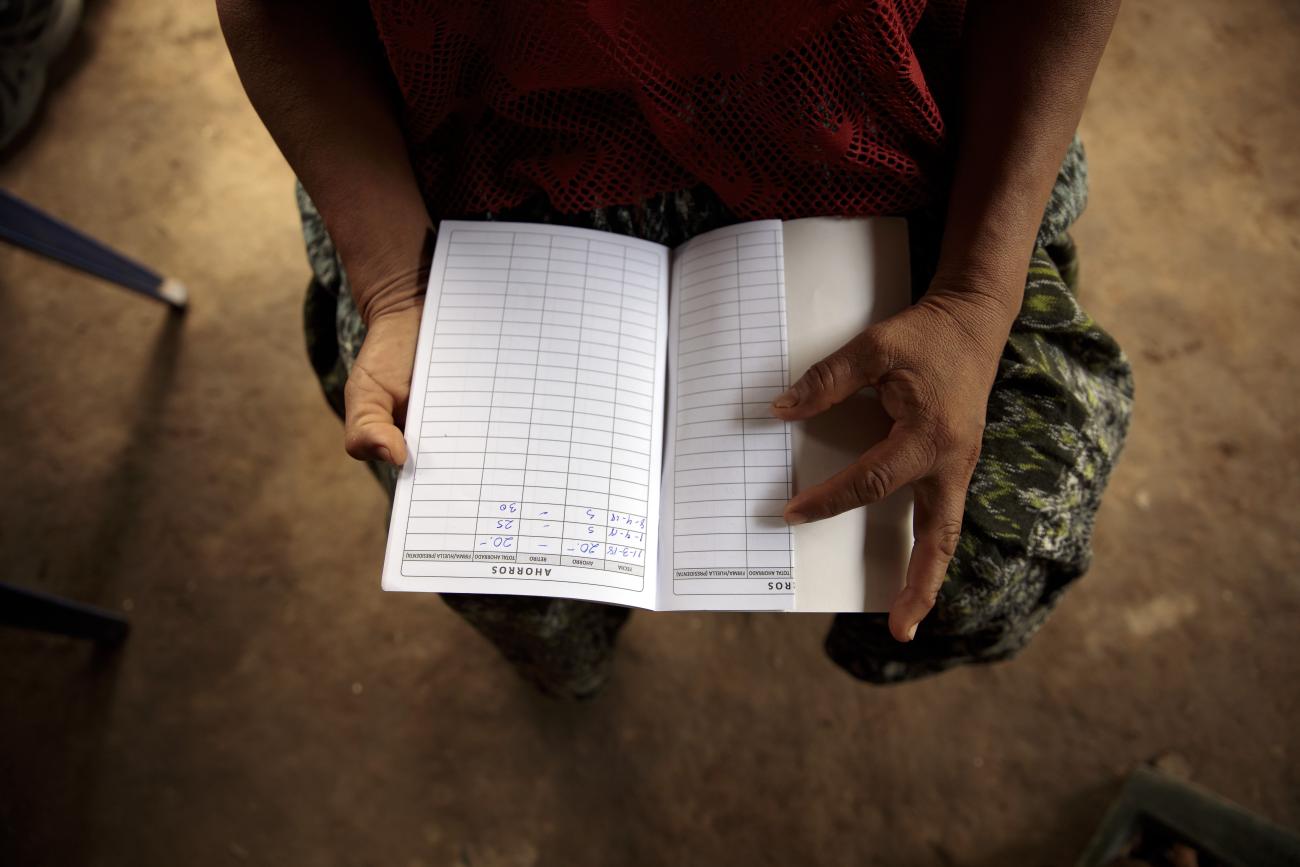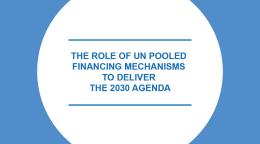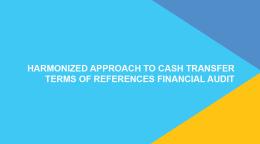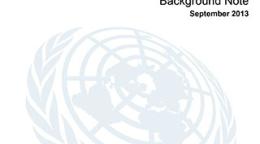
Financing and Funding
The Way Forward
Between US$ 3.3-4.5 trillion per year needs to be mobilized to achieve the 2030 Agenda for Sustainable Development. The financing gap to achieve the SDGs in developing countries is estimated to be US$ 2.5 – 3 trillion per year (UNCTAD World Investment Report, 2014).
The Addis Ababa Action Agenda, adopted at the Third International Conference on Financing for Development and subsequently endorsed by the UN General Assembly in its resolution 69/313 of 27 July 2015, establishes a strong foundation to support the implementation of the 2030 Agenda. It provides a new global framework for financing sustainable development by aligning all financing flows and policies with economic, social and environmental priorities. It includes a comprehensive set of policy actions, with over 100 concrete measures that draw upon all sources of finance, technology, innovation, trade, debt and data, in order to support achievement of the SDGs.
Financing is about structuring different financial flows (public and private- domestic and international) to achieve the 2030 Agenda. Therefore, when we speak about financing development outcomes with the support of the United Nations, we refer to the role of the UN as catalyst to leverage those sources of finance, influence budget allocations and/or help shift funding priorities or investment decisions of donors, governments, or private sector actors, to better align with the SDGs.
Funding on the other hand, refers to the traditional concept of mobilizing resources through United Nations accounts in order to close budgetary gaps in the Cooperation Framework as the primary planning and implementation instrument for the United Nations to contribute to achieving the 2030 Agenda at the country level.
When we speak about funding development outcomes with the support of the UN, we refer to the role of the UN as a recipient/instrument to implement programmes with donor funds. This is the UN’s role as direct service provider and project implementer. While this role remains relevant, appropriate and needed in many contexts, the United Nations is increasingly stepping up and influencing broader financial flows for the development agenda.
The Funding Framework (replacing the previous Common Budgetary Framework) is developed in the context of the programming cycle, based on an assessment of the resources required to deliver the Cooperation Framework. The Funding Framework responds to the requirement of the Funding Compact agreed by Member States, committing the United Nations sustainable development system to be more transparent and accountable for its spending, and more effective and efficient in the use of limited resources. As such, the Funding Framework is a consolidation of the agreed, costed results of the Cooperation Framework, including operations and communications. It provides an overall picture of the amount, type, source, duration and sequence of financial resources, including the required amounts, available resources and resource mobilization needs. The Funding Framework is translated and operationalized annually as part of UN joint workplans.
The Cooperation Framework represents the instrument through which the UN leverages all sources of sustainable financing and investments towards attaining the 2030 Agenda and aims at expanding from “funding” the cooperation framework to “financing” the SDGs. In this context, resources channeled through the United Nations should play a complementary and catalytic role to address barriers, facilitate dialogue with diverse partners and enable governments to identify new sources of SDG financing and better align existing financial resources with national development plans.
Country-Level SDG Pooled Funds
Inter-agency pooled funds bring the UN together, strengthen coherence, reduce fragmentation, broaden the donor base, allow sharing risks with partners, and tackle multi-dimensional challenges with comprehensive, innovative solutions. While the UN has worked through pooled funds for over a decade in diverse settings and applications, including through standalone joint programmes, a new generation of Cooperation Frameworks offers an excellent opportunity to further scale and improve their efficiency and effectiveness through the establishment of country-level SDG pooled funds.
A country-level SDG pooled fund is a financing instrument available to each UNCT to consolidate and leverage funding towards the country priority SDGs as established in the Cooperation Framework. Country-level SDG pooled funds are complementary to other sources of local funding and are aligned with global pooled funding instruments. Experience demonstrates that, when underpinned by a good design, national ownership, and managed effectively, country-level SDG pooled funds are powerful and transformative financing instruments at the service of UNCTs. They provide flexibility to adapt to different country contexts, including financing joint action across the Humanitarian-Development-Peace Nexus, and mobilizing domestic and international resources.
There is a growing demand for this type of instrument, both from international partners and national governments. As of February 2023, over 25 active country-level pooled funds, many of them successors of the first generation “Delivering as One” funds, are already galvanizing UN joint action. More than 15 UNCTs are currently designing new national versions of this type of mechanism.
To learn more, please visit the Multi-partner Trust Fund and read the UNSDG Guidance to Country-Level SDG Pooled Funds
The Special Purpose Trust Fund (SPTF) for the new Resident Coordinator system
With the adoption of General Assembly Resolution 72/279, Member States adopted a hybrid funding system for the new Resident Coordinator system.
The successful implementation of the United Nations development system repositioning requires a fully-funded Resident Coordinator (RC) system, owned by the membership. The Special Purpose Trust Fund (SPTF), a specific fund housed within the UN Secretariat, has been established to receive, consolidate, manage and account for all contributions and financial transactions of the new RC system, in a transparent and effective way. The SPTF web portal displays in real-time all commitments, contributions and expenditures recorded for the fund.
All contributions count and their symbolic value is far greater than the sum of their parts. The aim is to expand the ownership and funding base to the maximum, building a robust system by all, for all.
Funding sources include three streams: voluntary contributions from Member States, the doubling of cost-sharing amounts from UN entities who are members of the United Nations development system, and a 1 per cent levy applied to contributions for UN development-related activities earmarked to a single agency, single programme or project.
To see the latest contribution to the SPTF, please visit the SPTF web portal.
The Joint SDG Fund
The Joint SDG Fund is an inter-agency, pooled mechanism for integrated policy support and strategic financing. We act as a bridge for those taking action to deliver substantive and efficient results on the 2030 Agenda for Sustainable Development.
People, planet, and prosperity are the fundamentals, but to transform our world we need to get the right economic, social and environmental policies in place. We also need to secure significant, ongoing resources by brokering innovative financing solutions.
The Joint SDG Fund’s role is to incite a shift in the way we “do” development, placing the focus on policy, investments, financing, and partnerships. We provide flexible, reliable, and regular support to development programmes that embody new ways of thinking. Initiatives are built on context-specific, scalable, and integrated approaches.
Inspired by the Secretary-General’s reform of the United Nations, the Joint SDG Fund works across all 17 global goals to transform current development practices and put countries on a sustainable and resilient track. A critical instrument for incentivizing and enabling new approaches, we draw from existing expertise across the United Nations Development System and a broad network of partners. Think of us as the “muscle” for a new generation of United Nations Country Teams (UNCTs) and Resident Coordinators.
Stimulating shifts in the uptake of integrated and transformative policies can lead to the creation of smart financing strategies that put SDG progress into high gear at global, regional, and country levels. The programmes we support are nationally owned and led, each built on a country’s unique United Nations Sustainable Development Cooperation Framework.
We plan to Leave No One Behind by accelerating SDG gains and mainstreaming intersectional issues like human rights, gender, youth, the environment, and people with disabilities.
To learn more, please visit the Joint SDG Fund website.
















